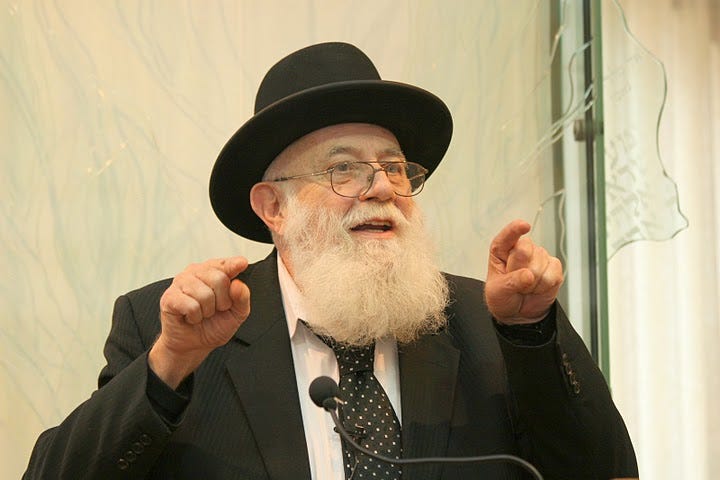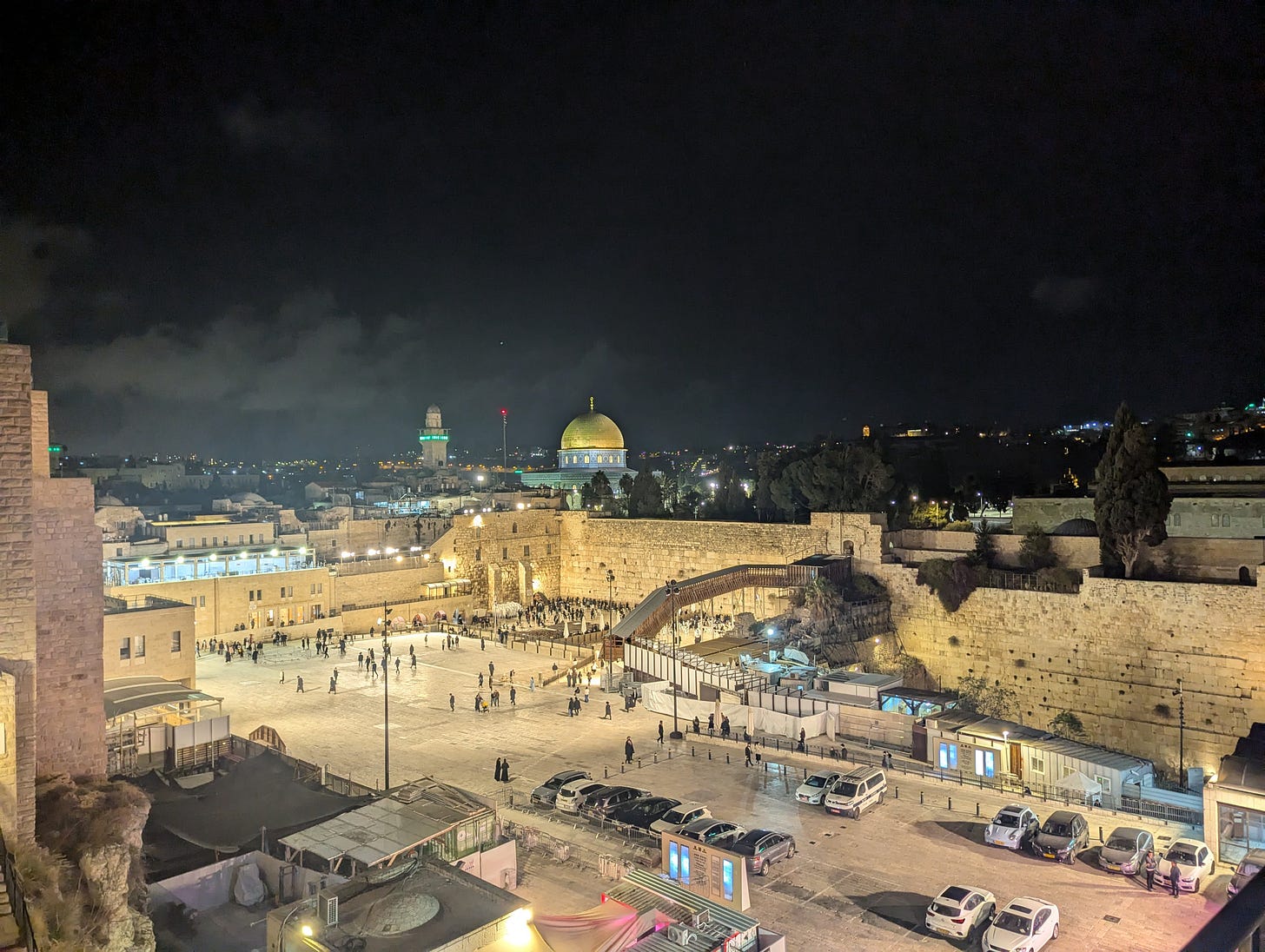Rabbi Noah Weinberg: The Fire of Torah Lives On
Let's say that you believe in the God of the Torah as Orthodox Jews conceive of it. If God came to this earth, what would be the biggest desecration of God’s name, or Chilul Hashem? What would God be concerned about?
There are many possible answers, but to one rabbi in particular, the answer would be the fact that 80% of Jews in the world don't regularly observe the commandments of the Torah. They don't light Shabbat candles, they eat pork and non-kosher things and they don't follow most of the laws.
Rabbi Noah Weinberg was raised observant in New York and he had a vision: he wanted to bring non-observant Jews back to Judaism. He was the kind of person who had a lot of energy, a magnetic personality and a clear purpose.
He would debate with men and women of all ages. He would bring people in, uplift them and give them education and advice. He built Aish HaTorah , which means “Fire of the Torah” in Hebrew, into one of the most important and biggest baal teshuva yeshivas in the world. It exists to help Jewish men and women, in an affiliated seminary, become more observant, learn about Torah, practice Judaism and learn how to reconnect with their past and their traditions.
I recently finished the major biography of him, Rav Noach Weinberg: Torah Revolutionary. He empowered those around him and let them run their own projects. People would bring him an idea, and he would say, "Great, go do it." He wanted you to solve the problem yourself, raise money and would even encourage people to create their own organizations. That’s the kind of thing he was excited about.
Aish created major and successful branches in St Louis, Toronto, Los Angeles and London, and more, all leading to thriving communities.
He was also involved in these "discovery seminars," three- or four-day intensives that traveled around the country and the world, giving people different proofs for the existence of God and the truth of the Torah. For about a 10 or 15-year period, these seminars were really life changing. Skeptical people would attend, ask a bunch of questions and leave convinced.
However, he was also a highly controversial figure due to his worldview. He believed the greatest desecration of God's name was the widespread lack of Jewish observance. He thought the answer was for more Orthodox Jews to be involved in outreach to less observant Jews. He criticized the Orthodox community for not doing enough to engage and welcome all Jews into the fold. In his view, there were too many Jews studying Talmud all day and not enough out there trying to bring others in.
He felt that many were overly risk-averse and that families didn't want to have non-observant people at their Shabbat tables. He charged the Jewish community with failing to embody the ideal of being a light unto the nations. Instead of going out to bring others closer, he thought they were retreating inward.
He also had very different approaches to how a yeshiva should run. Unlike a normal yeshiva, which focuses primarily on studying the Talmud, the oral law, for eight or even ten hours a day, his vision was that people should learn the basics first.
He thought Talmud is important and, eventually, Jews should get there, but he believed students needed to be convinced first. They would memorize the 613 commandments, learn Jewish philosophy, and understand the basics first.
They would take his classic daily course, the 48 Ways To Wisdom, which gives Torah tools for personal growth. A recording of his class is available here. I’ve also started to type up summarizes of his individual lectures:
48 Ways to Wisdom: Overview
Rabbi Noach Weinberg, zt"l, helped countless people grow in their Judaism. He founded one of the biggest baal teshuva organizations, Aish HaTorah, which continues to help unaffiliated Jews increase their religious observance and connection to God.
Maybe after nine months or even a year in yeshiva, you’d open up a page of Talmud. This caused huge disagreements between him and the other rabbis, and he was criticized for it. Rabbi Weinberg founded one yeshiva, and after a big dispute with other rabbis, it split up. The remnants of that yeshiva became three or four other yeshivas, including Aish.
For many years, he struggled to get Orthodox people involved in kiruv (outreach). The solution he settled on was to basically turn Aish into a place that would create a “kiruv army.” People would study there and then go back out into the world to help others join them. Overall he was extremely successful.
He was a fighter for Klal Yisrael, the entire Jewish people. He had a clear mission and accomplished it. His students have gone on to establish many other organizations and communities that have continued to grow. There are so many families that wouldn’t exist without him.
Last week, I finally got to visit Aish in person. It is located on some of the most prime real estate in the world. It overlooks the Kotel, the Western Wall, the most sacred place in Judaism today. On Thursday nights, they have a festive shiur (a lecture). They have free food, live music and then the rabbi gives a short speech. It was inspiring to be in the environment I have read so much about. It also shows that his vision endures.
Rabbi Yitzchak Berkovits is the Rosh Yeshiva, or head, of Aish. He also founded and continues to run the Jerusalem Kollel, which trains outreach rabbis.
Rabbi Berkovits discussed the week’s Torah portion where Jacob returns to the land of Israel and meets his brother Esau. They had been estranged for decades because Jacob essentially took the blessing from his father that Esau was supposed to receive.
Jacob spend many years living under Laban, his father-in-law, who ran his life with deceit and trickery. Jacob sends a message saying that he still kept the Torah and the laws for all those years. The takeaway is that Jews rise when they are threatened. When they are challenged, they wake up. In tough times, Jews come together and become even stronger.
The rabbi said that assimilation is like a war and that time is against the observant community. There are fewer and fewer people to even approach, he said. Every Jew must work hard to reverse the tide and bring more Jews to discover their roots, learn more about Judaism and grow.
He wondered if one reason antisemitism exists is because it challenges Jews and makes us become even stronger. He pointed out that after the October 7th attacks, there might have been more people lighting Shabbat candles in Israel that following Friday than at any time since the Second Temple stood.
I finally got to see Aish and its campus and how Rabbi Noah Weinberg’s legacy continues today.
This essay is adapted from the voice memos I send to friends and family:





